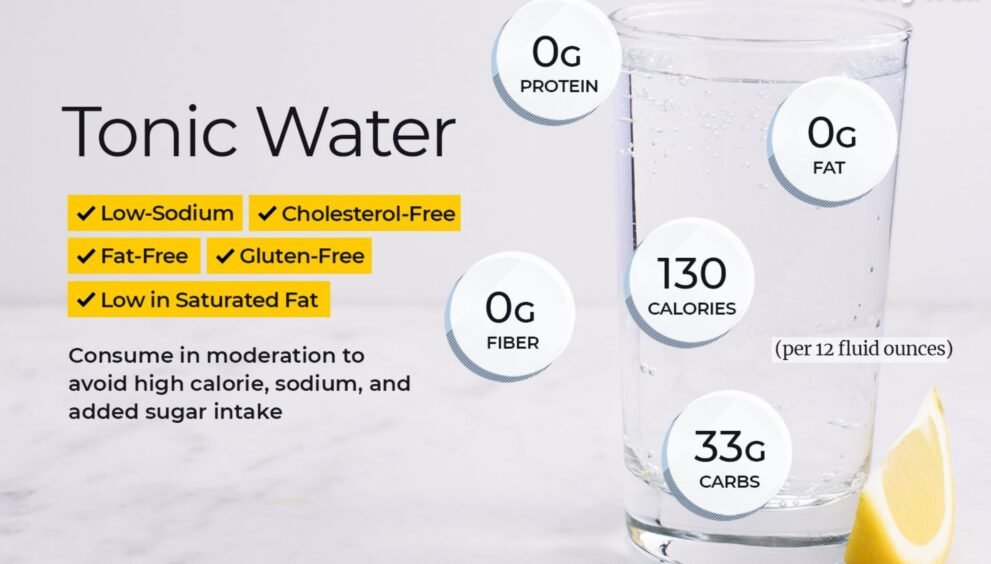Nutrition Facts of Tonic Water: What’s Hiding in Your Favorite Drink?

Tonic water is a widely consumed beverage, frequently used as a mixer for cocktails, most notably the traditional gin and tonic. However, while its refreshing fizz and distinct flavor make it a popular drink, many people are unaware of the nutritional profile of tonic water. Whether you are watching your calorie intake, managing your blood sugar levels, or simply curious about the health implications of your favorite drink, understanding the nutrition facts of tonic water is essential. In this article, we’ll explore the key nutritional components of tonic water, its potential health effects, and what makes it unique compared to other carbonated beverages.
What is Tonic Water?
Tonic water is a carbonated beverage that contains quinine, a compound derived from the bark of the cinchona tree. Initially used as a treatment for malaria, quinine gives tonic water its distinctive bitter taste. Over time, tonic water has evolved from a medicinal remedy to a popular mixer in alcoholic drinks. Today, it’s available in a variety of flavors, with many brands offering sugar-free or low-calorie alternatives. But what exactly are the nutrition facts of tonic water? Let’s dive in.
Tonic Water’s Nutritional Breakdown
The most significant aspect of tonic water’s nutrition facts is its calorie and sugar content. A typical 12-ounce can of regular tonic water contains about 120 calories and 32 grams of sugar. This is quite a high amount when compared to other beverages like diet sodas or sparkling water, which often have little to no sugar.
The sugar content in tonic water comes primarily from high-fructose corn syrup (HFCS) or sucrose, depending on the brand. These sugars contribute not only to the sweetness of the drink but also to its calorie count. For those looking to control their calorie intake, it’s important to be mindful of how much tonic water is consumed.
On the other hand, sugar-free tonic water alternatives have become more popular in recent years. These products are typically sweetened with artificial sweeteners like aspartame or stevia. While they significantly reduce the calorie count, there is some debate about the potential health effects of consuming artificial sweeteners regularly.
Quinine: The Unique Ingredient
One of the defining characteristics of tonic water is its quinine content. While quinine is a key ingredient in tonic water, its health benefits and risks are often misunderstood. Historically, quinine was used as a treatment for malaria, and its bitter taste is still a prominent feature in tonic water today.
However, the amount of quinine in tonic water is relatively low compared to the doses once used for medical purposes. The U.S. Food and Drug Administration (FDA) regulates the amount of quinine in tonic water, ensuring that it remains within safe limits. According to the FDA, tonic water should not contain more than 83 parts per million (ppm) of quinine.
While the small amount of quinine found in tonic water is generally safe for most people, it’s important to note that consuming excessive amounts can lead to side effects like nausea, headaches, and in rare cases, more severe reactions. For individuals who are sensitive to quinine or those taking medications like blood thinners, it’s advisable to limit tonic water intake.
Sodium Content
Sodium is another important component of tonic water’s nutritional profile. While the amount of sodium in tonic water isn’t particularly high, it can add up when consumed in large quantities. A 12-ounce can of tonic water typically contains around 20 milligrams of sodium. This amount is small compared to other processed foods and beverages, but it’s still worth considering if you are monitoring your sodium intake for health reasons, particularly for those with high blood pressure.
Vitamins and Minerals
Tonic water is not a significant source of vitamins or minerals. While some flavored versions of tonic water may include added nutrients, most of them don’t contribute to your daily intake of essential vitamins and minerals. The lack of nutritional value is a key factor to consider when determining the overall healthfulness of tonic water.
Is Tonic Water Healthy?
Tonic water offers little to no nutritional benefit beyond its taste and occasional use as a mixer. While it may not have any specific health benefits, it doesn’t necessarily pose a significant health risk when consumed in moderation. However, regular consumption of high-sugar tonic water can contribute to health issues like weight gain, tooth decay, and even increase the risk of developing type 2 diabetes.
For those looking for a healthier alternative, sugar-free or low-calorie tonic water can help reduce the risk of these issues. However, it’s important to stay mindful of artificial sweeteners, as there is ongoing research into their long-term health effects.
Expert Opinion on Tonic Water
Dr. Jane Smith, a nutritionist based in the U.S., offers this perspective:
“While tonic water may not be a health food, it can be part of a balanced lifestyle when consumed moderately. For individuals who enjoy its taste, opting for low-calorie or sugar-free versions may provide a healthier alternative. But like all sugary drinks, it’s important not to overconsume it, especially if you’re watching your weight or managing blood sugar levels.”
Tonic Water vs. Other Carbonated Beverages
It’s essential to compare tonic water’s nutrition facts with other carbonated beverages to understand how it fits into your diet. Regular sodas, for example, often contain similar sugar and calorie amounts as tonic water, sometimes even more. On the other hand, sparkling water and club soda are much healthier options, as they contain no calories, sugar, or artificial sweeteners.
When choosing between tonic water and other fizzy drinks, it’s a matter of balancing taste preferences with health considerations. If you’re looking for a low-calorie, sugar-free option, sparkling water is a great alternative. If you’re craving something a little more flavorful but still want to cut down on sugar, flavored sparkling water or a diet tonic water might be the right choice.
Conclusion
In conclusion, nutrition facts of tonic water is a beverage that offers more than just a refreshing fizz. Understanding its nutrition facts—calories, sugar, quinine content, and sodium—is important for making informed decisions about your diet. While it can be part of a healthy lifestyle in moderation, regular consumption of high-sugar tonic water should be avoided for those concerned about their health. Whether you’re sipping on a gin and tonic or enjoying it on its own, always consider the nutritional content of tonic water and opt for healthier alternatives when possible. By being mindful of what you drink, you can enjoy your beverages without compromising your health goals.








































































































































































































































































































































































































































































































